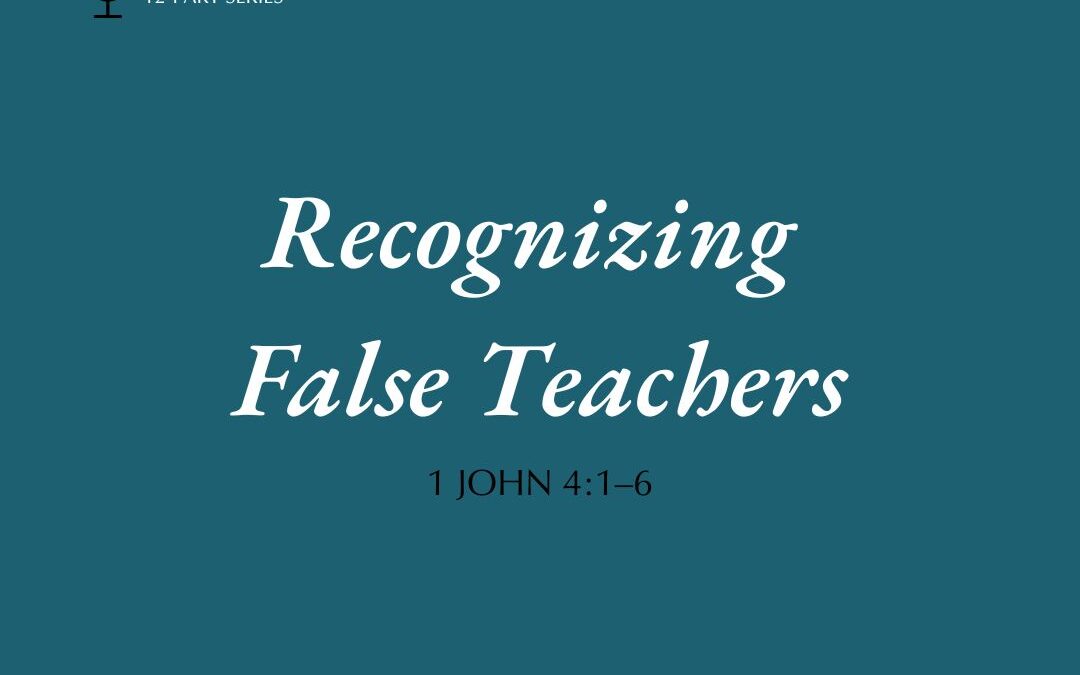
by Melinda Savoy | Nov 1, 2023 | Recognizing False Teachers
The Bible repeatedly acknowledges the reality of false teachers. This was true in the Old Testament, when false prophets arose among the people. The same is true in the New Testament, as false teachers in the first century sought to undermine the biblical Jesus and the biblical gospel. It is important to know that Scripture calls God’s people to recognize, identify, and avoid false teachers.

by Melinda Savoy | Nov 2, 2023 | Recognizing False Teachers
In 1 John 4, the apostle John warns first-century Christians about false teachers and the dangerous and damning influence they have. At the same time, his warning is every bit as vital for us as Christians today. Scripture insists that we be informed and stay alert for this constant danger lurking across the entire world.

by Melinda Savoy | Nov 3, 2023 | Recognizing False Teachers
The passage of Scripture that we are examining together in this series reveals that there are two competing versions of the Christian faith. There is a true Christian faith and a false or distorted Christian faith.

by Melinda Savoy | Nov 6, 2023 | Recognizing False Teachers
1 John chapter 4 contains several verses to help Christians identify and distinguish the true teachers of the Christian faith from the false ones. Moreover, John stresses that if you have a biblical view of God, then you understand the Christian faith.

by Melinda Savoy | Nov 7, 2023 | Recognizing False Teachers
In this great text, John demands that all of us who are true followers of Jesus Christ diligently apply several biblical tests and that we apply those tests to every spiritual idea and every spiritual message in order to distinguish genuine teachers who teach God’s saving truth from false teachers who teach damning error.

by Melinda Savoy | Nov 8, 2023 | Recognizing False Teachers
In this section of 1 John, the apostle John teaches that if any preacher or teacher teaches anything other than the biblical Jesus, they are false teachers. Therefore, they are not empowered by the Holy Spirit; they are empowered by demons, and their version of the Christian faith is not the true saving faith, but it is a false damning substitute.

by Melinda Savoy | Nov 9, 2023 | Recognizing False Teachers
In 1 John 4, the apostle John, writing under the inspiration of the Holy Spirit, says that you must believe in the biblical Jesus in order to be saved—you have to believe that Jesus of Nazareth is the Son of God, the Messiah, who has come in the flesh.

by Melinda Savoy | Nov 10, 2023 | Recognizing False Teachers
In 1 John 4, the apostle John helps Christians understand how to differentiate between true and false teachers, true and false views of God, true and false views of Jesus Christ, and true and false views of the gospel.

by Melinda Savoy | Nov 13, 2023 | Recognizing False Teachers
In this passage, John the Apostle, and ultimately our Lord Jesus Himself, is demanding that each of us diligently apply several biblical tests to every spiritual idea and every spiritual message to distinguish genuine teachers from false teachers. But it is important to recognize that false teachers will, in fact, use the Bible in their messages.

by Melinda Savoy | Nov 14, 2023 | Recognizing False Teachers
As the apostle John continues to help Christians identify true and false teachers, he teaches that all true Christians recognize the Scripture as God’s authoritative Word.

by Melinda Savoy | Nov 15, 2023 | Recognizing False Teachers
In 1 John 4, the apostle John describes how all true believers recognize the truthfulness of God’s Word and long to put themselves under its authority—to believe it and obey it. However, false believers, that is, those who claim to know Christ but really don’t, refuse to put themselves under the authority of the Word of God.

by Melinda Savoy | Nov 16, 2023 | Recognizing False Teachers
A common characteristic of false teachers is that they subtly distort God’s Word by either undermining its truth or finding ways to add to it—either by supposed new revelation or intuition. Rather than preaching and teaching the Word of God for what it is—the word of God—they promote views that are contrary to what Scripture says about itself.

Recent Comments